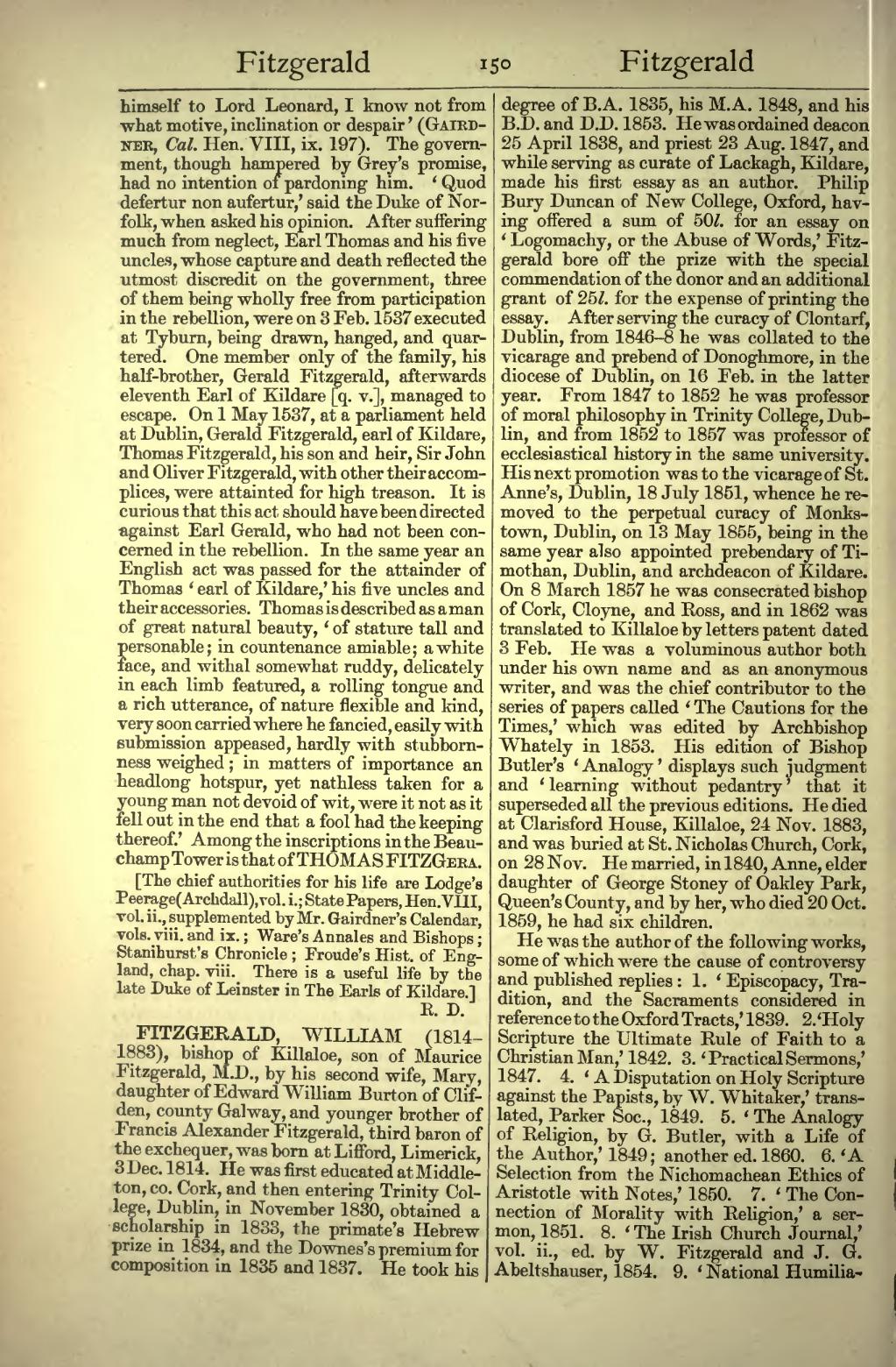himself to Lord Leonard, I know not from what motive, inclination or despair' (Gairdner, Cal. Hen. VIII, ix. 197). The government, though hampered by Grey's promise, had no intention of pardoning him. 'Quod defertur non aufertur,' said the Duke of Norfolk, when asked his opinion. After suffering much from neglect, Earl Thomas and his five uncles, whose capture and death reflected the utmost discredit on the government, three of them being wholly free from participation in the rebellion, were on 3 Feb. 1587 executed at Tyburn, being drawn, hanged, and quartered. One member only of the family, his half-brother, Gerald Fitzgerald, afterwards eleventh Earl of Kildare [q. v.], managed to escape. On 1 May 1537, at a parliament held at Dublin, Gerald Fitzgerald, earl of Kildare, Thomas Fitzgerald, his son and heir. Sir John and Oliver Fitzgerald, with other their accomplices, were attainted for high treason. It is curious that this act should have been directed against Earl Gerald, who had not been concerned in the rebellion. In the same year an English act was passed for the attainder of Thomas 'earl of Kildare,' his five uncles and their accessories. Thomas is described as a man of great natural beauty, 'of stature tall and personable; in countenance amiable; a white face, and withal somewhat ruddy, delicately in each limb featured, a rolling tongue and a rich utterance, of nature flexible and kind, very soon carried where he fancied, easily with submission appeased, hardly with stubbornness weighed; in matters of importance an headlong hotspur, yet nathless taken for a young man not devoid of wit, were it not as it fell out in the end that a fool had the keeping thereof.' Among the inscriptions in the Beauchamp Tower is that of THOMAS FITZGera.
[The chief authorities for his life are Lodge's Peerage (Archdall), vol. i.; State Papers, Hen. VIII, vol. ii., supplemented by Mr. Gairdner's Calendar, vols. viii. and ix.; Ware's Annales and Bishops; Stanihurst's Chronicle; Froude's Hist. of England, chap. viii. There is a useful life by the late Duke of Leinster in The Earls of Kildare.]
FITZGERALD, WILLIAM (1814–1883), bishop of Killaloe, son of Maurice Fitzgerald, M.D., by his second wife, Mary, daughter of Edward William Burton of Clifden, county Galway, and younger brother of Francis Alexander Fitzgerald, third baron of the exchequer, was born at Lifford, Limerick, 3 Dec. 1814. He was first educated at Middleton, co. Cork, and then entering Trinity College, Dublin, in November 1830, obtained a scholarship in 1833, the primate's Hebrew prize in 1834, and the Downes's premium for composition in 1835 and 1837. He took his degree of B.A. 1835, his M.A. 1848, and his B.D. and D.D. 1853. He was ordained deacon 25 April 1838, and priest 23 Aug. 1847, and while serving as curate of Lackagh, Kildare, made his first essay as an author. Philip Bury Duncan of New College, Oxford, having offered a sum of 50l. for an essay on ‘Logomachy, or the Abuse of Words,’ Fitzgerald bore off the prize with the special commendation of the donor and an additional grant of 25l. for the expense of printing the essay. After serving the curacy of Clontarf, Dublin, from 1846–8 he was collated to the vicarage and prebend of Donoghmore, in the diocese of Dublin, on 16 Feb. in the latter year. From 1847 to 1852 he was professor of moral philosophy in Trinity College, Dublin, and from 1852 to 1857 was professor of ecclesiastical history in the same university. His next promotion was to the vicarage of St. Anne's, Dublin, 18 July 1851, whence he removed to the perpetual curacy of Monkstown, Dublin, on 13 May 1855, being in the same year also appointed prebendary of Timothan, Dublin, and archdeacon of Kildare. On 8 March 1857 he was consecrated bishop of Cork, Cloyne, and Ross, and in 1862 was translated to Killaloe by letters patent dated 3 Feb. He was a voluminous author both under his own name and as an anonymous writer, and was the chief contributor to the series of papers called ‘The Cautions for the Times,’ which was edited by Archbishop Whately in 1853. His edition of Bishop Butler's ‘Analogy’ displays such judgment and ‘learning without pedantry’ that it superseded all the previous editions. He died at Clarisford House, Killaloe, 24 Nov. 1883, and was buried at St. Nicholas Church, Cork, on 28 Nov. He married, in 1840, Anne, elder daughter of George Stoney of Oakley Park, Queen's County, and by her, who died 20 Oct. 1859, he had six children.
He was the author of the following works, some of which were the cause of controversy and published replies:
- ‘Episcopacy, Tradition, and the Sacraments considered in reference to the Oxford Tracts,’ 1839.
- ‘Holy Scripture the Ultimate Rule of Faith to a Christian Man,’ 1842.
- ‘Practical Sermons,’ 1847.
- ‘A Disputation on Holy Scripture against the Papists, by W. Whitaker,’ translated, Parker Soc., 1849.
- ‘The Analogy of Religion, by G. Butler, with a Life of the Author,’ 1849; another ed. 1860.
- ‘A Selection from the Nicomachean Ethics of Aristotle with Notes,’ 1850.
- ‘The Connection of Morality with Religion,’ a sermon, 1851.
- ‘The Irish Church Journal,’ vol. ii., ed. by W. Fitzgerald and J. G. Abeltshauser, 1854.
- ‘National Humilia-
